UNVEILING SAM: THE MOVEMENT REVOLUTIONIZING AGRICULTURE THROUGH SMART AGRICULTURE MECHANIZATION
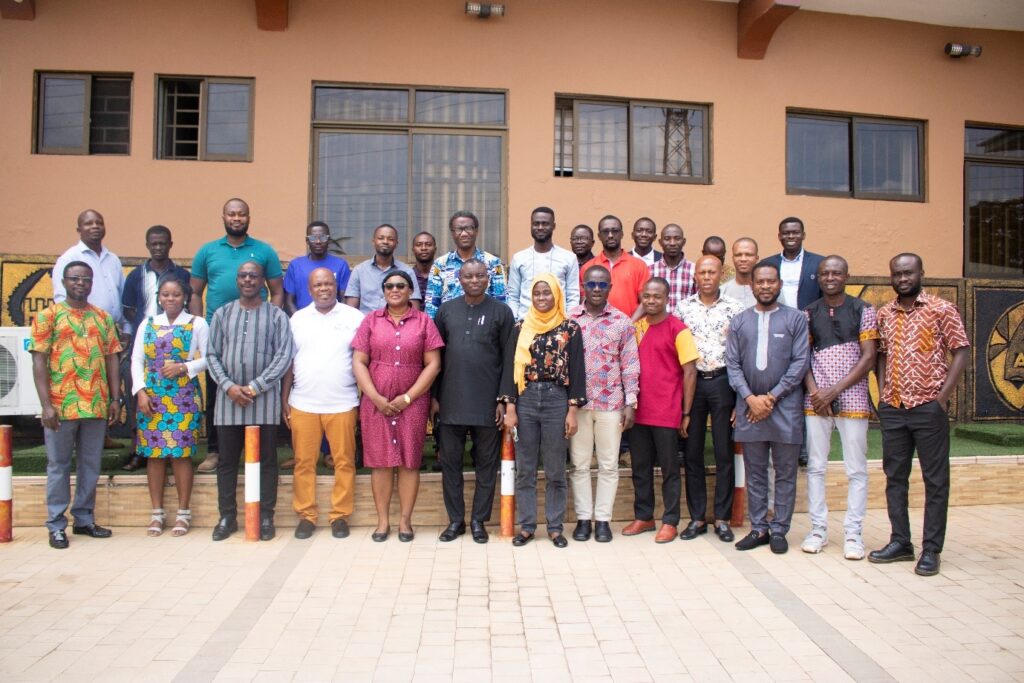
“This year, farmers in the Northern Region faced challenges preparing and harvesting their rice fields due to the lack of mechanized agricultural equipment. This predicament resulted in numerous farmers being unable to sow their crops or harvest the few ones they managed to plant.“
The above statement represents a heartfelt story shared by Professor Shaibu Abbul-Ganyiu, the Dean of the School of Engineering at the University of Development Studies (UDS), during the Sustainable Agricultural Mechanization (SAM) Stakeholder Workshop held at Anita Hotel in the Ashanti Region of Ghana. The concern raised by Prof. Abdul-Ganyiu isn’t uncommon. In fact, this is the fate of numerous farmers within in Ghana. Agriculture without Engineering, particularly mechanization, has been the tale for many farmers for many decades. However, given the current state of agriculture in Ghana, the only viable solution for breakthrough is to embrace sustainable agricultural mechanization technologies and practices for the entire agricultural value chain.
While the use of agricultural mechanization techniques and services is currently low in Ghana with 77.6% of farm operations being largely performed manually, Ghana is one of a few African countries where the uptake of SAM has recently grown. Mechanization service providers (MSPs) and operators are often unable to meet farmers’ demands either due to a lack of linkages with their customers or too far distances between the machinery and farms demanding services leading to an underutilization of machinery capacity. In addition, MSPs and MSOs do not necessarily promote sustainable mechanization
SAM Stakeholder Engagement Workshop
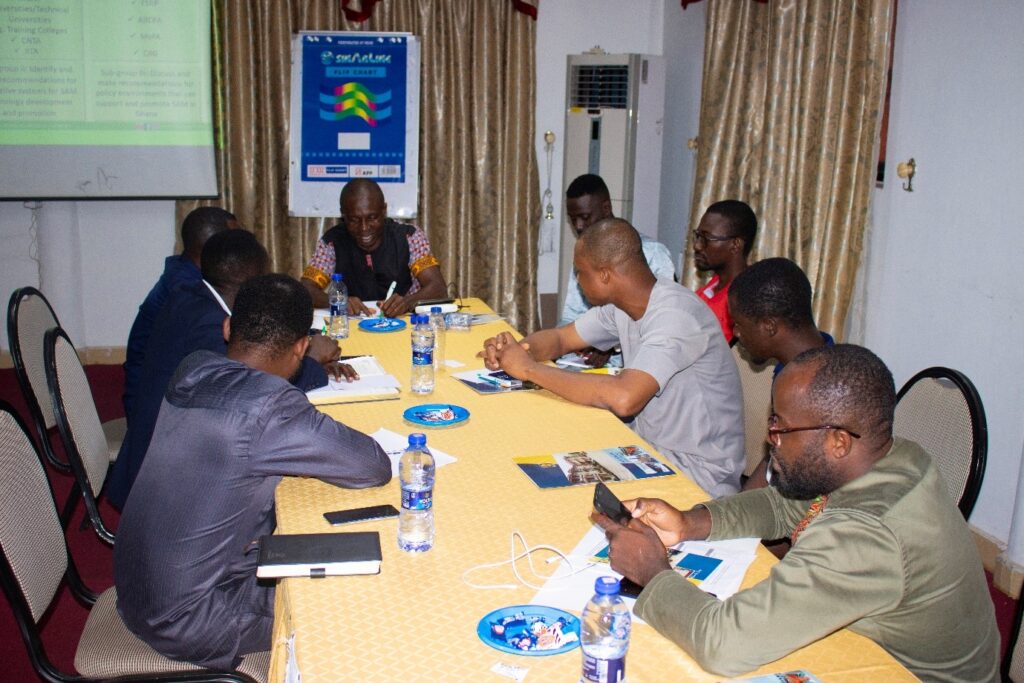
The Korea Green Growth Trust Fund (KGGTF) in collaboration with the AIICRA Ghana Cluster is supporting the promotion of sustainable agricultural mechanization practices and technologies in Ghana through the Go Smart Mechanization! Project. The overall objective of the Go smart mechanization! grant is to promote the use of SAM and Conservation Agriculture in West Africa and to expand access of smallholder farmers to SAM technologies, services, and information in Ghana. The project, brought together stakeholders along the agricultural mechanization value together during a two-day workshop held at the Anita Hotel in Kumasi. The main objective of the workshop was to identify and bring together relevant stakeholders along the SAM value chain in Ghana to brainstorm and chart strategies for the promotion of sustainable agricultural mechanization technologies in Ghana.
The two-day workshop convened a diverse group of stakeholders from both the private and public sectors in agriculture, including Mechanization Service Providers, Farmers, Agribusiness owners, Representatives from the Technical Universities and the Agricultural training colleges, Agricultural Extension Officers, the Ministry of Food and Agriculture (MOFA), representatives from the Chamber of Agribusiness Ghana as well as mechanization equipment importers, fabricators and after sales service providers.
Purpose of Gathering
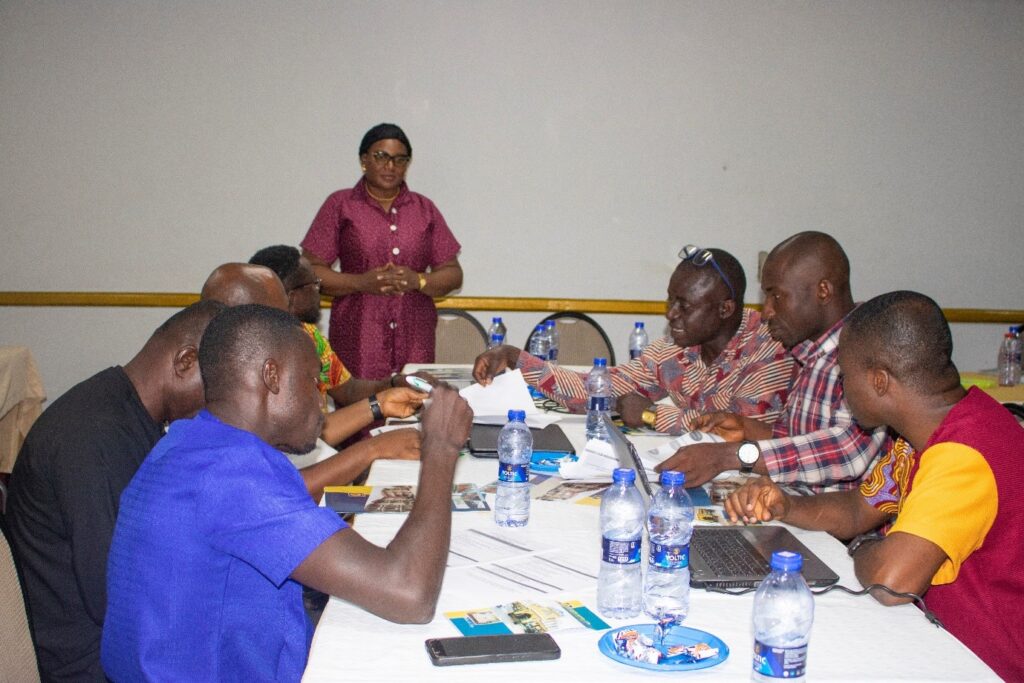
Dr. Stephen Yeboah, a Senior Research Scientist of CSIR-CRI and the AICCRA Ghana Technical Focal Point, in his opening remarks, expressed gratitude to the AICCRA project and the African Conservation Tillage Network (ACT) for spearheading the promotion of sustainable agricultural mechanization activities in the country. He emphasized that the need for collaboration among mechanization actors on the agricultural value chain for the promotion of sustainable agricultural mechanization in the country.
Dr. Shadrack Kwadwo Amponsah was introduced by Dr Patricia Amankwaa-Yeboah, the convenor of the workshop, as a co-facilitator of the workshop. He introduced participants to the objectives of the workshop emphasizing that, “We are here to solicit ideas on how to promote sustainable agricultural mechanization in the country. The whole idea is to brainstorm and learn how we can support and partner with existing Smart Agricultural Mechanizations (SAM) efforts across the country.“
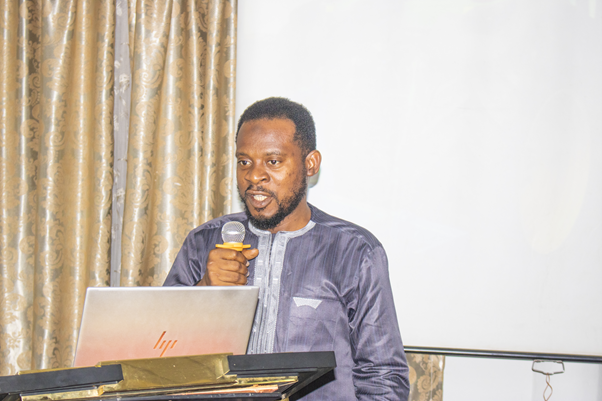
Expectations of Stakeholders
Dr. Amponsah continued the introductory session, inviting the stakeholders to introduce themselves and the capacities they fill in the agricultural value chain. Following that, stakeholders mentioned the expectations they had for the workshop, including:
- I want to leverage the ideas shared at the workshop and foster smart Agric mechanization in my region.
- I hope the workshop’s outcomes will be widely available and accessible to farmers and other agricultural stakeholders.
- By the end of this workshop, I want to see how we could include local artisan in the SAM program. We could also leverage on the expertise of the local artisans who are already into the agricultural implement development and fabrication to improve the SAM program.
- Expectation to integrate what we learn here into Agricultural colleges curriculum to practicalize tractor operations in the colleges.
- My expectation is to make the technology economically viable, good marketing system, gender parity and sensitization for our students in the colleges.
Sustainable Agricultural Mechanization
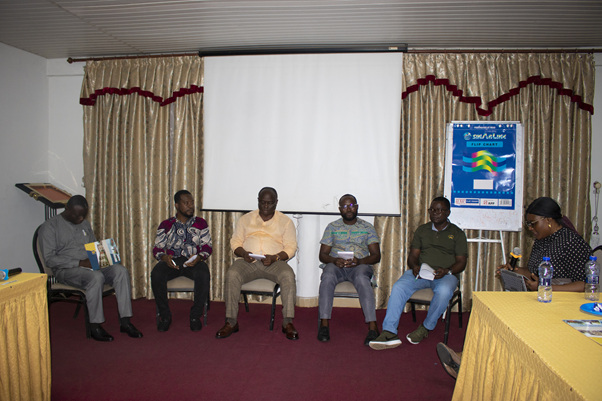
Dr. Patricia Amankwah Yeboah, the convenor of the workshop, in her presentation, shed light on the imperative need for sustainable agricultural mechanization in Ghana. She explained that the current system of mechanization in Ghana is leading to soil degradation and low productivity. SAM aims to address challenges in traditional farming methods by leveraging simple, socio-culturally acceptable and cost-effective mechanization technologies to make agriculture more precise, resource-efficient, and environmentally friendly. She emphasised that the Go Smart Mechanization! Project in Ghana is piloting the use of SAM/CSA/CIS bundles for crop production along four crop value chains, namely maize, cowpea, yam and sweetpotato. The SAM technologies includes the use of equipment and implements such as rippers, crimpers, earth augers and jab planters whilst the climate smart agriculture (CSA) technologies include the use of improved seeds which are drought as well as pest and disease tolerant alongside improved production and good agronomic practices. The use of climate information services (CIS) is being promoted in pilot intervention area to improve resilience of the crop production systems.
She brought attention to the Framework for Sustainable Agricultural Mechanization in Africa (F-SAMA), emphasizing that Ghana is currently very low on the mechanization scale grappling with adopting mechanization technologies. She further stated that as part of efforts to improve access and adoption of sustainable mechanization technologies in the sub region, the African Conservation Tillage Network (ACT) has initiated the Go smart Mechanization! Project with funding from the Korea Green Growth Trust Fund through the World Bank Group.
SAM Piloting
Current efforts being undertaken as part of the Go Smart Mechanization Project include:
The Creation a digital platform for sustainable agricultural mechanization known as Africamechanize. Development of strategic policy documents for the promotion of SAM.
Scaling up of SAM in FSRP countries
Farmers are already sending waves of testimonies due to the benefits they are gaining from the SAM. The Agric Rep from Techiman, who joined the stakeholders meeting, testified to the benefits he and the farmers of the region are enjoying from the SAM pilot. He stated, “We have been exposed to good land preparation methods using simple SAM equipment like rippers to prepare our fields. Now we know it’s not just about using tractors and plough for land preparation; there are other efficient and sustainable technologies we have been exposed to, and it’s yielding amazing results on our fields.“
Subgroup and Panel Discussion
Participants divided themselves into three subgroups and discussed diverse issues such as identifying and making recommendations for innovative business and financing models for the promotion and adoption of SAM in Ghana; identifying and making recommendations for innovative systems for SAM technology development and promotion; and discussing and making recommendations on policy environments that can support and promote SAM in Ghana. Additionally, a five-member panel was set up, and they tackled critical questions about the SAM initiative, addressing government and institutional support, financial models, farmers’ needs, accessibility of SAM through digitalization, and academia’s role in promoting SAM.
SAM in Action
The workshop concluded with a roadmap for SAM’s future. Stakeholders proposed collaborations to make inputs geared towards sustainable agricultural mechanization into the Ghana Agricultural Engineering Policy. Other relevant recommendations like establishing communication channels, stakeholder engagement, and expanding SAM’s scope to include irrigation, animal rearing, and the inclusion of marginalized groups as part of ongoing SAM pilot activities were also made.
Conclusion
The SAM workshop was a transformative, gathering and uniting diverse stakeholders with a shared vision for sustainable agricultural mechanization in Ghana. This workshop is the first of its kind help in Ghana to solely deliberate on sustainable agricultural mechanization issues. SAM is like a vehicle on its lanes with a clear destination in mind. SAM’s destination is to see that every smallholder farm in Ghana is equipped with and has adopted smart agricultural mechanization technologies in a few years to come. The insights, recommendations, and collaborative spirit showcased during these two days laid the foundation for an optimistic sustainable agricultural future.
Authors: Patricia Konadu Mensah, Dr. Patricia Amankwah-Yeboah, Dr. Stephen Yeboah, Bernard Sakyiamah, Enoch Bobie Agyemang
